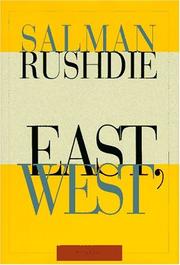

EAST, WEST
Stories
by Salman Rushdie
Nine stories, six of which have been previously published, that successfully explore the tensions and confusions that so often muddle relations between East and West. Divided into three groups, the stories are a reminder that Rushdie (Haroun and the Sea of Stories, 1991, etc.), the accomplished postmodern fabulist, is also a splendid realist storyteller who describes the human heart with clear-eyed sympathy. Grouped under the heading "EAST," the first trio describes an encounter between a young Pakistani woman and an advice expert, who doesn't understand why the young woman is happy when the British Consulate rejects her application to join her aging fiancé in England ("Good Advice is Rarer than Rubies"); a poor young man, who has "the rare quality of total belief in his dreams" of moviedom success and who is sterilized because he believes the Indian government will give him a free radio ("The Free Radio"); and two children who try to have their greedy father robbed of a precious religious relic he is determined to add to his collection ("The Prophet's Hair"). Of the three stories in "WEST," the most accomplished is "At the Auction of the Ruby Slippers," which describes a world where auctioneers "establish the value of our pasts, of our futures, of our lives" as they auction off movie memorabilia and cultural icons that help us be what "we fear we are not — somebody." The stories in the final section, "EAST, WEST," are all set in England. A young Indian learns too late of a betrayal by a now-dead English friend ("The Harmony of the Spheres"); two Indian diplomats, Star Trek fans and old school chums, have a prophetic conversation while posted in England ("Chekov and Zulu"); and a young Indian, recalling the unlikely friendship between his ayah and an elderly chess player in London, refuses to choose between East and West ("The Courter"). A product of both worlds, Rushdie builds a safe passage over the seemingly unbridgeable with generous insight and wry humor in this distinguished collection.